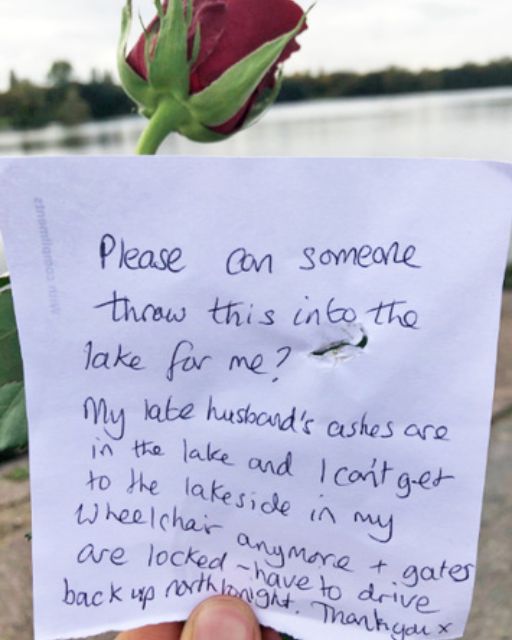One peaceful evening, as the sun dipped behind the trees and painted golden streaks across the still lake, something unusual caught my eye near the water’s edge. Resting gently on the rocks was a single red rose—its petals fresh and vivid against the soft glow of twilight. Attached to its stem was a note, the handwriting delicate and heartfelt, as though every word had been written with care. It was signed by someone named Clara, who explained that she could no longer make her way to the lake—her wheelchair made the steep path too treacherous now—but this place held the most cherished piece of her past. It was where her late husband’s ashes had been scattered two years prior. She had left the rose in hopes that someone might carry it to him.
There was something profoundly moving in her words—an aching honesty that stirred something deep within me. I gazed out over the lake’s calm surface, then gently placed the rose on the water, watching as it floated toward the center. A gentle breeze caught it, and it drifted like a whispered farewell. I stayed until it became nothing more than a blur in the distance, wrapped in a feeling I couldn’t quite name—somewhere between sorrow and serenity, as if I’d unknowingly stepped into a sacred moment.
Clara stayed in my thoughts the next day. I couldn’t stop thinking about the note, about the quiet love it carried, and the loneliness woven between the lines. I wandered into a small café near the lake, looking for warmth in a cup of coffee and a little solitude. That’s where I met Evelyn, an older woman with kind eyes. We struck up a conversation, and when I mentioned the rose and the note, her face softened with familiarity. She was Clara’s mother-in-law.
Evelyn spoke about Clara with gentle honesty. Clara had fallen in love with her son, Daniel, when they were in college. Their love had been deep and immediate, and though their time together was heartbreakingly short, it was full of joy. Daniel had died suddenly two years ago. The lake had been their sanctuary, and Clara chose it as the place to scatter his ashes one breezy autumn day. Since then, she had sent a rose each year in his memory. As her health declined, it became harder to make the trip herself. This year, Evelyn had placed the rose for her, hoping that someone kind might notice. Somehow, that person turned out to be me.
In the weeks that followed, I returned to that café more and more, drawn by our growing bond and the gentle wisdom in Evelyn’s stories. One afternoon, she surprised me with an invitation to meet Clara. Without hesitation, I agreed.
Clara greeted me with a reserved but genuine smile. There was a strength in her gentleness, the kind that comes from surviving loss while still holding on to love. At first, we talked about everyday things—music, books, the changing weather. Slowly, she opened up about Daniel—the way he laughed, how he danced in the kitchen to cheer her up, and the countless plans they once made while sitting by the lake. Each memory she shared came with a mix of tears and laughter, and I listened, humbled to be a witness to her heart.
What began as a quiet act of kindness—helping a rose find its way across the water—blossomed into a deep and unexpected connection. Clara and I became close, offering each other support in ways we hadn’t even known we needed. She was rebuilding herself through grief. I was rediscovering the quiet strength of showing up for someone else.
Eventually, Clara invited me to a small ceremony by the lake. She had commissioned a memorial bench in Daniel’s honor, nestled in a peaceful spot overlooking the water. Engraved on it were the words: “Where love lingers, time stands still.” As we sat side by side, she reached for my hand and whispered, “You reminded me that I’m not alone. That kindness still finds its way.”
I looked at Clara, the lake, the bench—and felt something shift inside me. Healing, I realized, doesn’t always come with fanfare. Sometimes, it arrives on the current of a simple gesture, like a rose drifting into the distance. That single, quiet act became the thread that wove two strangers’ lives together in a bond of remembrance, hope, and grace.
In the end, the rose was more than a tribute to loss. It marked a beginning—a living symbol of how love, once given, never truly fades. It flows forward, gently and unexpectedly, connecting hearts in quiet, lasting ways.
